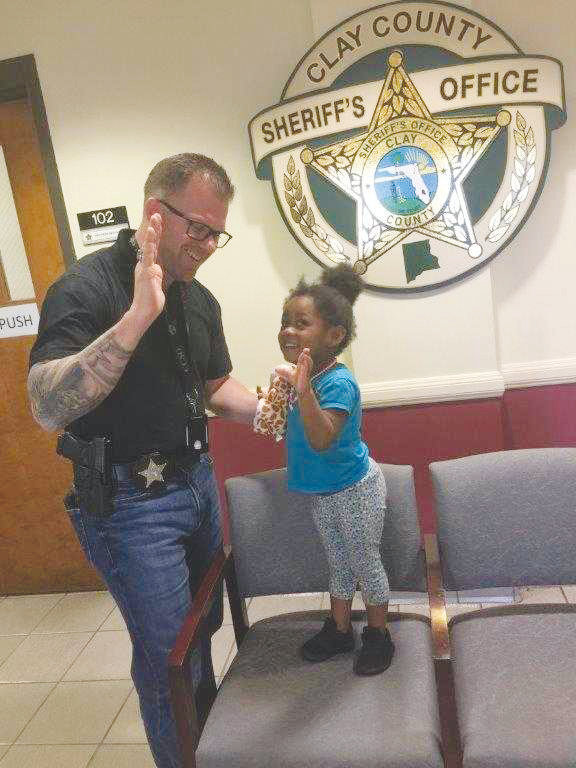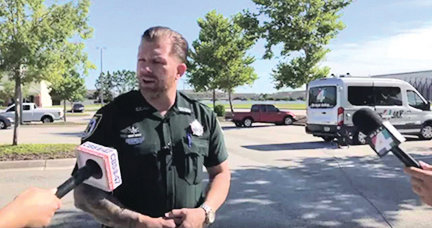That’s a wrap …
CCSO spokesman Padgett transitions away from spotlight, realities of police work
GREEN COVE SPRINGS – Chris Padgett will step away from the backdrop of flashing blue lights and yellow crime scene tape next week.
He won’t have to answer calls in the middle-of-the-night for …
This item is available in full to subscribers.
Attention subscribers
To continue reading, you will need to either log in to your subscriber account, or purchase a new subscription.
If you are a current print subscriber, you can set up a free website account and connect your subscription to it by clicking here.
If you are a digital subscriber with an active, online-only subscription then you already have an account here. Just reset your password if you've not yet logged in to your account on this new site.
Otherwise, click here to view your options for subscribing.
Please log in to continueDon't have an ID?Print subscribersIf you're a print subscriber, but do not yet have an online account, click here to create one. Non-subscribersClick here to see your options for subscribing. Single day passYou also have the option of purchasing 24 hours of access, for $1.00. Click here to purchase a single day pass. |
That’s a wrap …
CCSO spokesman Padgett transitions away from spotlight, realities of police work
GREEN COVE SPRINGS – Chris Padgett will step away from the backdrop of flashing blue lights and yellow crime scene tape next week.
He won’t have to answer calls in the middle-of-the-night for missing person or a shooting. There won’t be any more sound checks, live remotes or social media updates.
The spokesman for the Clay County Sheriff’s Office soon will be putting away his bulletproof vest, firearm and microphone. Padgett officially will be Code 10-1 – out of service – at the end of his shift on Aug. 29.
While he will leave the sheriff’s office, he knows the job won’t ever leave him. He saw the very best, and very worse, of human behavior. He’s received hugs from children and consoled families of the dead. He helped put some of the most-despicable criminals behind bars, and he’s helped organize neighborhood block parties.
But there was too much suffering, too much blood and a single gunshot on a July 2016 evening that will affect his transition into civilian life – and a return to the pulpit. Traumatic stress is the price all cops pay for wearing the badge.
“I’m a minister at heart,” Padgett said. “That’s what I did before law enforcement. I never intended to become a police officer. As someone who never intended to go into law enforcement, I’ve got a decade in it. It’s time for something else.”
For Padgett, that means a commitment to helping other officers find ways to deal with their stress. He helped create a Critical Incident Stress Management program for other first responders in Clay County. Too many officers internalize their grief, fears and anxiety, he said. It’s why more law enforcement officers have died by suicide in the last three years than are killed on the job, and it helps explain why so many others slip into a world of drug and alcohol use.
It wasn’t supposed to be like that for Padgett. Law enforcement wasn’t his true calling. It was a necessity. His young ministry wasn’t paying the bills, so he applied at the sheriff’s office.
“My wife, children and I made a decision to find the next-nearest thing that I could do to serve Clay County, and law enforcement was it,” Padgett said in an exclusive interview with Clay Today. “I’ve been here (in Clay County) since the day I was born. I wanted to work here.”
Police academies can’t prepare a deputy for the real world. Padgett learned that quickly when he responded to a call south of Green Cove Springs for a man hanging in a tree.
“That was the first call that I really remember,” Padgett said. “We get there, it’s Halloween time and there’s decorations hanging from the trees. We can’t find the body. We started to walk around, and a frantic woman comes out and leads us over to the body. I did a quick pulse, tried to lift him up, he’s dead. No question.”
Padgett had to guard the body for two hours until the crime scene unit arrived from Orange Park and completed their work. He eventually cut the man down, went home, took a shower and climbed into bed as if nothing happened.
That was the first of many emotional bricks.
He responded to a man who’d was accused of shooting at his brother. The man was 6-foot-5, 290 pounds and he immediately tried to overpower Padgett. The fight lasted 2½ minutes.
“My vest gets ripped off, my radio gets thrown down and busted, my eyeglasses are shattered,” he said. “I had him in a headlock; he had me pinned against my car and he’s trying to grab my gun. I can’t remove my gun to eliminate the threat because he’s overpowering me. All I can do is hunker down on this, keep him in a headlock and keep his hand off my holster. He slipped out and I was able to maneuver around and taser him in the back and get him secure.”
He again went home, washed away the blood, and crawled into bed.
“(My wife) never knew what I went through,” Padgett said. “I just fought for my life from a man who was trying to get my gun and kill me. Where do you externalize these things?”
Another brick added to the pile.
Padgett also was one of the investigators in the 2014 rape and murder of a Middleburg woman by Donald Davidson. Padgett uncovered the graphic details of the crime, including repeated rapes of the woman’s 10-year-old daughter.
Another brick.
But a call to Citation Drive at Lake Asbury forever changed two families. A former U.S. Marine, Billy D. Smith, had been firing at deputies in an hours-long standoff. He then stepped outside and pointed his Barretta 9-millimeter handgun at Padgett.
“I had to pull the trigger from 57 yards away, and he dies. I just shot and killed a Marine Corps veteran with post-traumatic stress who was 31 years old,” Padgett said. “It's something I’ve thought about every single day since.”
The pile of emotional bricks suddenly collapsed.
Padgett knew he needed help when he had an anxiety attack while driving to Keystone Heights. Despite being in a squad car, he stopped on the side of the road and openly cried.
“The day I pulled the trigger, my life changed,” he said. “The next year after that was one of the most-horrific times in my life. I’m not going to hold that in anymore. I’ve been through a lot of crazy stuff, even before law enforcement. I realized a year after my shooting post-traumatic stress is real. I believe there is a disorder. Humbly, God had to reveal it to me in the manner he did because I’m stubborn, bullheaded or ignorant. Through my incident, it changed my mindset.”
Padgett credits Sheriff Darryl Daniels for creating a CISM program to give deputies an outlet to vent their emotions. Daniels credits Padgett for bringing passion and energy to the agency.
Padgett said he’s starting to find some solace by seeing a therapist. She said the shooting wasn’t the lone reason for his stress. His emotions were burdened by too many bricks, she said, and the shooting finally made them tumble.
As Padgett approaches the last few days as a sheriff’s deputy, he’s looking forward to rebuilding his life, one brick at a time.
“Don’t get me wrong: I thought there were people who probably who dealt with traumatic things,” he said. “But overall, shamefully, I must admit I thought they were just weak-minded people – people who couldn’t understand all the stuff I went through prior to my shooting. My concept was to shut up and move on. That was my thought process, even as a minister.”
Padgett hopes his faith, along with an understanding of his own emotions, will bring more peace. And he’s starting to find answers and relief to the questions that, like so many others in blue, he’s been trained to hide.













